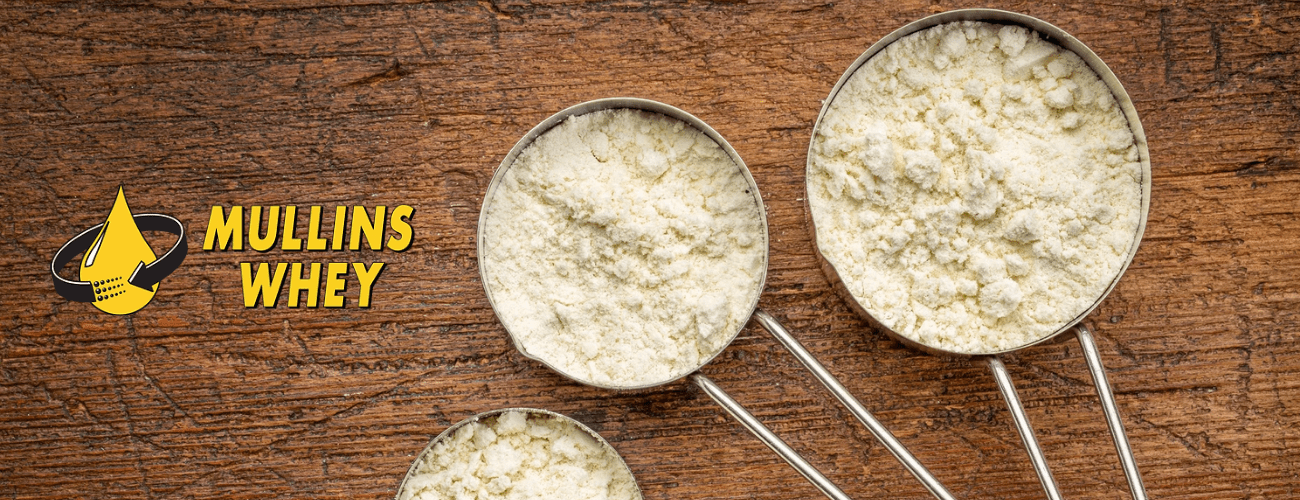Mullins
Years of continuous growth to Mullins Cheese leads to the install of our first sweet whey condensing plant in 1988. The 1990's and early 2000's are met with more growth opportunities resulting in the construction of a state-of the-art whey processing facility. In 2001, Mullins Whey is established when entering the whey protein isolate (WPI) market. Since then, growth through innovation has led us to offer a prominent brand line of dried whey products for the human nutrition and animal feed industries. Today, we continue to push the envelope of dairy based product offerings.
Mullins has complete control of our whey supply from cheese development through the drying process. This ensures quality and consistency throughout the entire process for all of our products. Continuous reinvestment in our facilities with the latest and most efficient technologies keeps Mullins and our product line at the forefront of the industry standards. As a private operation, we are more versatile to work with our customers to customize the product to suit your functional needs. [->]
Mullins Whey has >80,000 Dairy cows producing 7 MILLION LBS OF MILK/Day.
Mullins is certified with : HACCP | Halal | GRAS | HACCP
Products offered are : Whey Protein Isolate Instantized 90% | Lactose 200 mesh | Lactose IP 200 Mesh
Products
Lactose 200 Mesh
Lactose 200 mesh refers to lactose that has been finely milled to a particle size of 200 mesh (approximately 74 microns). The fine particle size enhances solubility, flowability, and uniformity in formulations, making it more suitable for specific applications in pharmaceuticals and food products. It is a naturally occurring disaccharide sugar found primarily in milk and dairy products, consisting of two simpler sugars: glucose and galactose, with the molecular formula C₁₂H₂₂O₁₁. It makes up around 2–8% of milk by mass and is extracted from whey. The body uses the enzyme lactase to break down lactose into glucose and galactose, serving as an important energy source, especially for infants. Lactose is 30% as sweet as sugar and plays a significant role in nutrition and the dairy industry.
Grades offered are : Lactose 200 mesh | Lactose IP 200 mesh
Lactose 200 mesh Applications
| Industry | Application |
|---|---|
| Pharma | Tablets and capsules, syrups, antacid tablets, antibiotic suspension, vitamin and mineral supplements, nasal sprays |
| Nutra | Used as sugar replacement in many applications like Nutrition Bars, Nutritional supplements, Dietary supplements |
| Infant foods | Infant formulas, baby yogurts, Dairy-base baby cereals |
| Beverages | Protein milk shakes, fruit juices , Instant drinks |
| Bakery | Bread, Biscuits, cakes, muffins, baked goods, Chocolate bars, frozen desserts |
| Confectionery | Compound Chocolates, Milk Chocolates, Dark Chocolates, Milk Toffees, fudges |
| Dairy | yogurts, Cheese, Ice cream, Buttermilk, Cottage cheese |
| Savoury and spreads | Dressings, Mayonnaises, Soups, Sauces, spices, seasoning, snack foods |
| Cosmetics | Powders, creams, and lotions, moisturizers, cleansers, skin creams |
Benefits of Lactose 200 mesh
- Lactose increases the absorption of certain minerals including calcium, magnesium and zinc
- Its impact is minimal on tooth decay compared to other sugars
- It has a relatively low glycemic index, which could make this sugar beneficial for diabetics
- Lactose contributes to a healthy intestinal flora. It stimulates the growth of beneficial intestinal bacteria such as bifidobacteria and lactobacilli. It also inhibits pathogenic bacteria
Specifications of Lactose 200 Mesh
| Specifications | Lactose |
|---|---|
| Lactose (by difference) | Min. 99% |
| Moisture | Max 0.5% |
| Ash | Max 0.3% |
| Protien | Max 0.3% |
| pH value | 4.5 - 7.0 |
Top FAQs on Lactose
Whey Protein Isolate Instantised 90%
Whey protein isolate is the most protein concentrated of the two forms of whey protein. Whey protein isolate is just whey protein concentrate that has been further processed to remove most of the lactose and fat. The vast majority of whey protein isolate will be made up of at least 90 percent protein. Whey protein isolate is overwhelmingly seen as the preferred option to whey protein concentrate. Whey protein isolate goes through a much more intense filtration process than does whey protein concentrate. This results in more carbohydrates and fats being removed, thus whey protein isolate is less calories than whey protein concentrate.
Whey protein isolate Applications
| Industry | Application |
|---|---|
| Nutra | Protein bars, Dietary supplements, Medical Nutrition food, baby food, Infant formulations, energy drinks |
| Food | chocolate coating, prepared foods, Chocolate compounds, Cultured products, Baked goods, Ice Cream and frozen desserts, flavored milk, , yogurt, cheese, smoothies, blended drinks |
Benefits of Whey Protein Isolate
- Rich source of amino acids
- Product with a low glycemic index
- Contains many of the same component found in Breast milk (infant food formula)
- Offers a high protein content with minimal fat and carbohydrates, suitable for low-carb diets
Specifications of Whey Protein Isolate
| Specifications | Value |
|---|---|
| Lactose | <=2.0% |
| Fat | <=2.0% |
| pH value | 6.0-6.5 |
| Protein | >91% |
| Moisture | <=6.0% |
| Ash | <=3.5% |
Top FAQs on Whey Protein Isolate
Certificates
- Aflatoxin, Allergen, BSE-TSE, GMO, Origin statement, Irradiation, Melamine, Vegetarian

